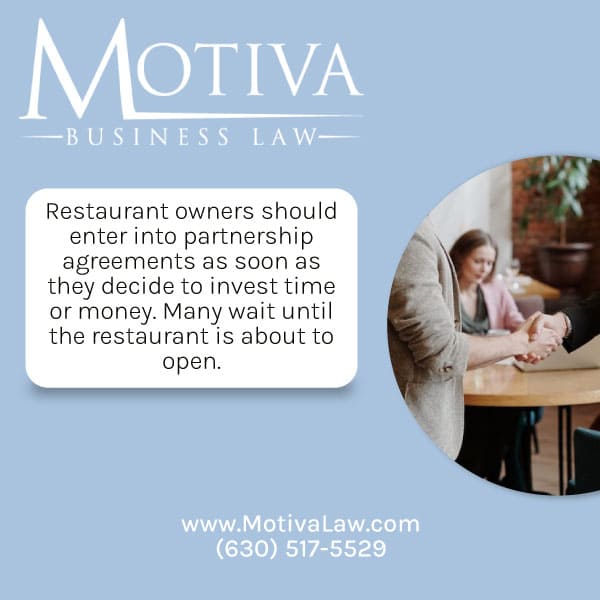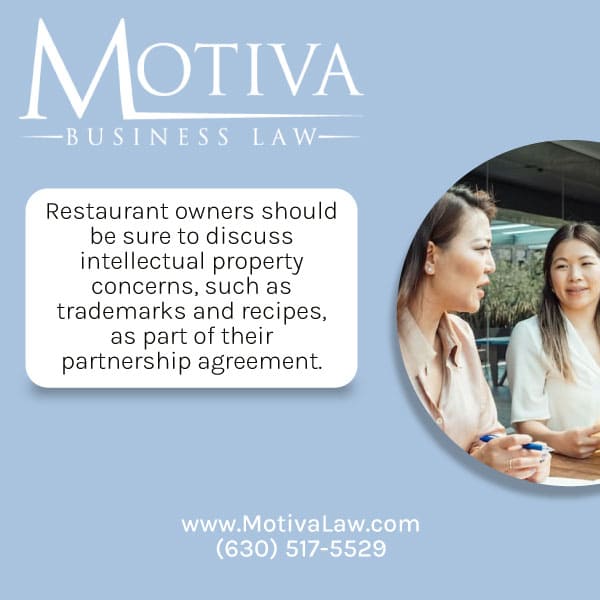When starting a restaurant, restaurant business owners should be careful to write up proper written agreements at the very beginning. One common mistake is that business partners will wait until the restaurant opens before they write a written partnership agreement (if they write one at all).
The problem with waiting is that by the time the restaurant opens, the business partners have already invested money, and they made major business decisions by then. What we see is that the business partners are in disputes even before the restaurant opens.
Many business owners think they can simply “trust” the business partner or that difficulties will not happen before the restaurant opens. However, the reality is that once people give up money expecting something in return, there is a chance for dispute.

Why do you need a well-written Restaurant Partnership Agreement
Restaurant business owners should agree to a written partnership agreement (such as an operating agreement or shareholder agreement) the minute they begin investing and making decisions so they know the terms of their investment. It’s also not common for one business partner to want to get out very early once they realize how stressful owning a food business can be. If the restaurant owners do not have a written business partnership contract, they won\’t know how to get out. This can lead to litigation, which can hurt, if not kill, the startup business.
In addition, the operating or shareholder’s agreement should include sections about what happens if a business owner passes away or becomes disabled.
Lastly, having your partnership agreements in place will show that a business is legitimate in case a plaintiff wants to sue and “pierce the corporate veil.” Piercing the corporate veil is when a plaintiff can go after a business owner’s personal assets if the plaintiff can show the business is a sham or an “alter-ego” of the business owners. Having a written shareholder’s agreement or operating agreement can help prevent that.
How to write a Business Partnership Contract for a Restaurant
In order to prevent business disputes and legal issues, restaurant owners must have strategic partnership agreements that contemplate key aspects of the business that are prone to bring liability. The best practice is to have an experienced business attorney write a contract that will protect both the company and its owners from future legal hazards.
Key terms to include in the restaurant partnership agreement include:
1. Name of the restaurant partnership
Specify the business’s generalities, such as the name of the restaurant, its location, and legal structure.
2. Contributions and Percentage of Ownership
It documents the cash, property, services, or other assets the partners contributed with for the formation of the business and whether they are to be taken as investments or loans. Specifies how much will they provide for future business needs.
It also determines which is the percentage of ownership of the restaurant for each partner. This typically depends directly on the contributions for the formation of the business.
3. Distribution of profits and losses
How will the profits and losses of the business will be split, especially, if the restaurant business is an LLC. It states the amount each partner will receive and the periodicity of the payment, and also if the partners are going to receive a salary, how much is there to expect.
The percentage of ownership can be a determining factor for the way profits are going to be split, but the business partners take the final decision.
4. Trademark and recipes ownership
Defines who owns the restaurant’s trademark, whether it is the company or an individual owner. Similarly, it determines who has the right over the restaurant’s recipes.
5. Procedures in case of death or exit of a partner
A restaurant partnership agreement must foresee modifications on the business ownership, such as the possibility of a member selling its proprietorship, or accepting new partners into the business.
It also dictates the procedures that must be taken in case one of the partners dies, becomes disables or decides to withdraw from the partnership. Similarly, it should also include the steps to take in case partners opt for the dissolution of the business.
The agreement must be prepared in a way that it describes how to handle each scenario and how the ownership interests will be transferred.
6. Partners\’ obligations and responsibilities
It’s paramount to describe the day-to-day obligations of the business owners and their decision-making process. You need to clarify which kind of decisions can be made individually, and which require the intervention of other business partners.
Your partnership agreement should also determine if a business partner needs to be employed to own part of the restaurant.
When the management duties of the partners are clearly stated, the chances of business dispute decrease.
7. Dispute Resolution
A skilled business attorney will determine what is the best way of solving a conflict. This section will determine whether there will be a mediation or arbitration to get to a fast resolution.
Food businesses have razor-thin profits, so even a small dispute between business partners, such as the ones originated for not having a written business agreement, can severely disrupt the business.

Common mistakes restaurant owners make
Restaurants are often smaller businesses started by friends or family members. Because there is an element of trust and familiarity, the restaurant owners will be very informal with the structure of the business. One example is “putting on paper” business owners that are different from the “real” business owners. For example, an owner puts the business in the wife’s name or brother’s name.
Restaurant business owners mistakenly think they are protecting themselves by putting the business in someone else’s name. This is a huge mistake because, frankly, courts are not stupid. If there is a lawsuit, the courts will absolutely look to see who is “really” running the business, and the “real” restaurant business owners can lose their personal assets. Also, if there is a dispute between the restaurant owners, the “fake” owner will have to participate in the lawsuit, which is not always possible.


